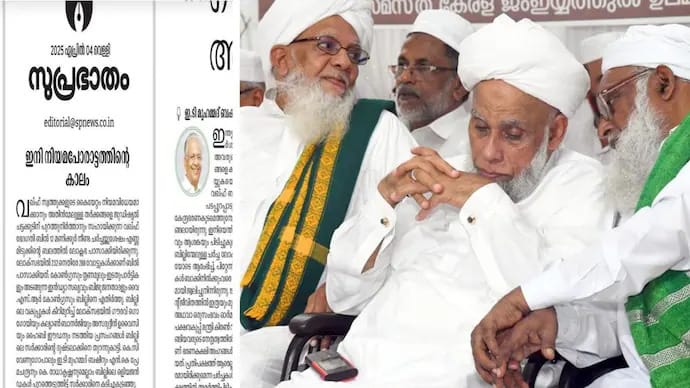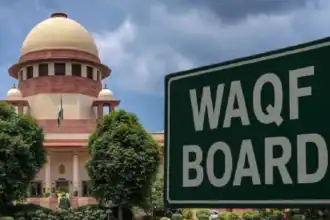Waqf Bill Controversy has taken a sharp political turn as the official mouthpiece of a prominent Kerala Muslim organization strongly criticized Congress leaders Priyanka Gandhi and Rahul Gandhi. The backlash centers on their alleged silence and perceived stance regarding the proposed Waqf legislation. The group accused the Gandhi siblings of betraying minority sentiments, intensifying the Waqf Bill Controversy across political and religious circles. This has sparked fresh debates on the role of opposition leaders in addressing issues that impact minority rights and religious institutions.

Congress leaders Rahul Gandhi and Priyanka Gandhi were criticized by Suprabhatam, the Malayalam spokesperson for a powerful Muslim organization in Kerala, for their lack of response to the Waqf amendment bill. The editorial urged legal opposition and referred to Priyanka’s absence as a negative mark.
Congress leaders Rahul Gandhi and Priyanka Gandhi Vadra came under heavy fire from Suprabhatham, the spokesperson for the powerful Muslim organization Samastha Kerala Jem-iyyathul Ulama, for their lack of response to the Waqf Amendment Bill.
Waqf Bill Controversy: Kerala Muslim Body Criticizes Gandhi Siblings’ Silence in Parliament
The Waqf Bill Controversy deepened with a strongly worded editorial published on April 4, where the Kerala Muslim body’s mouthpiece criticized Rahul Gandhi for staying silent on what it called a direct violation of Muslims’ fundamental rights. The editorial further described Priyanka Gandhi’s absence during the Parliamentary debate as a “black mark,” fueling frustration within the community.
The publication questioned Rahul Gandhi’s decision to remain mute on a measure that, in its opinion, violates Muslims’ fundamental rights and called Priyanka Gandhi’s absence during the Parliamentary debate a “black mark” in an editorial that was published on April 4.
“Where was Priyanka Gandhi when the BJP was destroying Muslims’ basic rights?” “The question why the opposition leader did not speak on the bill that will affect the unity of the nation will also be raised,” the editorial added.
The editorial did not hold back from identifying prominent Congress leaders for their lack of involvement in the discussion, even though it praised the larger opposition—which included the Congress, the Left, and the INDIA alliance—for opposing the Bill in Parliament.
Waqf Bill Controversy has been labeled “dangerous” by the Kerala Muslim body’s mouthpiece, which stressed that “now is the time for a legal battle.” The article asserted that the only viable path forward is to challenge the legislation in court, signaling that the issue extends beyond political rhetoric and demands urgent legal intervention.
Considering that Samastha is one of Kerala’s most influential Muslim organizations and has a substantial impact on the Muslim electorate, the editorial is noteworthy. This community in the state has historically supported the Congress.
A number of parties, particularly minority ones, have responded sharply to the Waqf reform bill that was just enacted in Parliament because they believe it to be an infringement on religious autonomy.
The Waqf Bill Controversy has ignited widespread debate across political, religious, and legal circles in India. The recent editorial by the Kerala Muslim body’s mouthpiece marks a critical escalation, accusing key Congress leaders, including Rahul Gandhi and Priyanka Gandhi, of remaining silent or absent during a pivotal moment in Parliament. Their lack of engagement on what has been described as a “dangerous” piece of legislation has drawn sharp criticism and is seen by many as a betrayal of the Muslim community’s trust.
As the Waqf Bill Controversy intensifies, the conversation is rapidly shifting from political rhetoric to legal redress. The editorial has explicitly called for challenging the bill in court, emphasizing that the legislation threatens fundamental rights enshrined in the Constitution. Community leaders and legal experts alike are preparing for what they describe as a necessary legal battle to protect religious autonomy and minority representation.
This controversy is not just another partisan clash—it has become a powerful symbol of the growing disconnect between political leadership and minority concerns. With pressure mounting on opposition leaders to take a clear stand, the Waqf Bill Controversy is likely to influence upcoming political campaigns, legal reforms, and community engagement strategies.
Ultimately, the outcome of this dispute will shape the future of religious governance and minority rights in India for years to come.















